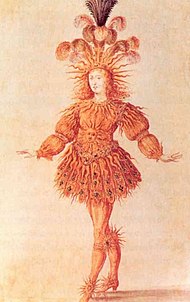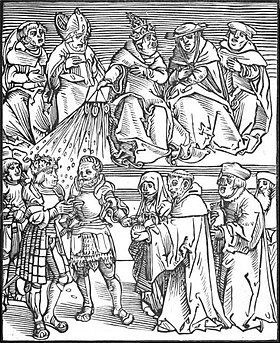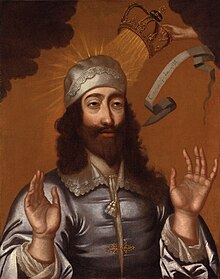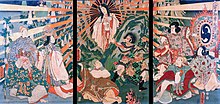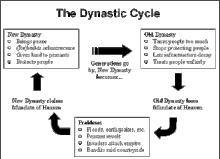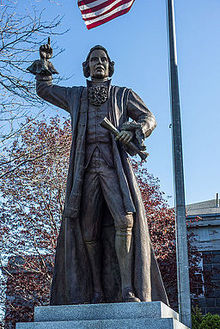The divine right of kings, divine right, or God's mandate is a political and religious doctrine of political legitimacy in a monarchy. It stems from a specific metaphysical framework in which a monarch is pre-ordained to inherit the crown before their birth. Under this theory of political legitimacy the subjects of the crown are considered to have actively (rather than merely passively) turned over the metaphysical selection of the king's soul – which will inhabit the body and rule them – over to God. In this way, the "divine right" originates as a metaphysical act of humility or submission towards God. The divine right has been a key element for legitimizing many absolute monarchies.
Consequentially, it asserts that a monarch is not accountable to an earthly authority (such as a parliament) because their right to rule is derived from divine authority. The monarch is thus not subject to the will of his people, of the aristocracy, or of any other estate of the realm. It implies that only divine authority can judge an unjust monarch and that any attempt to depose, dethrone or restrict their powers runs contrary to God's will and may constitute a sacrilegious act. It is often expressed in the phrase "by the Grace of God", attached to the titles of a reigning monarch; although this right does not make the monarch the same as a sacred king.
Historically, many notions of rights were authoritarian and hierarchical, with different people granted different rights, and some having more rights than others. For instance, the right of a father to respect from his son did not indicate a right for the son to receive a return from that respect; and the divine right of kings, which permitted absolute power over subjects, did not leave a lot of room for many rights for the subjects themselves.
In contrast, conceptions of rights developed during the Age of Enlightenment often emphasized liberty and equality as among the most important aspects of rights, for example in the American Revolution and the French Revolution.
Pre-Christian European conceptions
The Imperial cult of ancient Rome identified Roman emperors and some members of their families with the "divinely sanctioned" authority (auctoritas) of the Roman State. The official offer of cultus to a living emperor acknowledged his office and rule as divinely approved and constitutional: his Principate should therefore demonstrate pious respect for traditional Republican deities and mores. Many of the rites, practices and status distinctions that characterized the cult to emperors were perpetuated in the theology and politics of the Christianized Empire.
Christian conceptions
During early and middle ages
Outside of Christianity, kings were often seen as either ruling with the backing of heavenly powers or perhaps even being divine beings themselves. However, the Christian notion of a divine right of kings is traced to a story found in 1 Samuel, where the prophet Samuel anoints Saul and then David as mashiach ("anointed one")—king over Israel. The anointing is to such an effect that the monarch became inviolable so that even when Saul sought to kill David, David would not raise his hand against him because "he was the Lord's anointed".
Although the later Roman Empire had developed the European concept of a divine regent in Late Antiquity, Adomnan of Iona provides one of the earliest written examples of a Western medieval concept of kings ruling with divine right. He wrote of the Irish King Diarmait mac Cerbaill's assassination and claimed that divine punishment fell on his assassin for the act of violating the monarch. Adomnan also recorded a story about Saint Columba supposedly being visited by an angel carrying a glass book, who told him to ordain Aedan mac Gabrain as King of Dal Riata. Columba initially refused, and the angel answered by whipping him and demanding that he perform the ordination because God had commanded it. The same angel visited Columba on three successive nights. Columba finally agreed, and Aedan came to receive ordination. At the ordination, Columba told Aedan that so long as he obeyed God's laws, then none of his enemies would prevail against him, but the moment he broke them, this protection would end, and the same whip with which Columba had been struck would be turned against the king. Adomnan's writings most likely influenced other Irish writers, who in turn influenced continental ideas as well. Pepin the Short's coronation may have also come from the same influence. The Byzantine Empire can be seen as the progenitor of this concept (which began with Constantine I), which in turn inspired the Carolingian dynasty and the Holy Roman Emperors, whose lasting impact on Western and Central Europe further inspired all subsequent Western ideas of kingship.
In the Middle Ages, the idea that God had granted earthly power to the monarch, just as he had given spiritual authority and power to the church, especially to the Pope, was already a well-known concept long before later writers coined the term "divine right of kings" and employed it as a theory in political science. For example, Richard I of England declared at his trial during the diet at Speyer in 1193: "I am born in a rank which recognizes no superior but God, to whom alone I am responsible for my actions", and it was Richard who first used the motto "Dieu et mon droit" ("God and my right") which is still the motto of the Monarch of the United Kingdom.
With the rise of nation-states and the Protestant Reformation in the late 16th century, the theory of divine right justified the king's absolute authority in both political and spiritual matters. Henry VIII of England declared himself the Supreme Head of the Church of England, and exerted the power of the throne more than any of his predecessors. As a political theory, it was further developed by James VI of Scotland (1567–1625), and came to the force in England under his reign as James I of England (1603–1625). Louis XIV of France (1643–1715) strongly promoted the theory as well.
Scots texts of James VI of Scotland
The Scots textbooks of the divine right of kings were written in 1597–1598 by James VI of Scotland despite Scotland never having believed in the theory and where the monarch was regarded as the "first among equals" on a par with his people. His Basilikon Doron, a manual on the powers of a king, was written to edify his four-year-old son Henry Frederick that a king "acknowledgeth himself ordained for his people, having received from the god a burden of government, whereof he must be countable". He based his theories in part on his understanding of the Bible, as noted by the following quote from a speech to parliament delivered in 1610 as James I of England:
The state of monarchy is the supremest thing upon earth, for kings are not only God's lieutenants upon earth and sit upon God's throne, but even by God himself, they are called gods. There be three principal [comparisons] that illustrate the state of monarchy: one taken out of the word of God, and the two other out of the grounds of policy and philosophy. In the Scriptures, kings are called gods, and so their power after a certain relation compared to the Divine power. Kings are also compared to fathers of families; for a king is true parens patriae [parent of the country], the politic father of his people. And lastly, kings are compared to the head of this microcosm of the body of man.
James's reference to "God's lieutenants" is apparently a reference to the text in Romans 13 where Paul refers to "God's ministers".
(1) Let every soul be subject unto the higher powers. For there is no power but of God: the powers that be are ordained of God. (2) Whosoever, therefore, resisteth the power, resisteth the ordinance of God: and they that resist shall receive to themselves damnation. (3) For rulers are not a terror to good works, but to the evil. Wilt thou then not be afraid of the power? do that which is good, and thou shalt have praise of the same: (4) For he is the minister of God to thee for good. But if thou do that which is evil, be afraid; for he beareth not the sword in vain: for he is the minister of God, a revenger to execute wrath upon him that doeth evil. (5) Wherefore ye must needs be subject, not only for wrath but also for conscience sake. (6) For this cause pay ye tribute also: for they are God's ministers, attending continually upon this very thing. (7) Render therefore to all their dues: tribute to whom tribute is due; custom to whom custom; fear to whom fear; honour to whom honour.
Western conceptions
The conception of ordination brought with it largely unspoken parallels with the Anglican and Catholic priesthood, but the overriding metaphor in James's handbook was that of a father's relation to his children. "Just as no misconduct on the part of a father can free his children from obedience to the fifth commandment", James also had printed his Defense of the Right of Kings in the face of English theories of inalienable popular and clerical rights. The divine right of kings, or divine-right theory of kingship, is a political and religious doctrine of royal and political legitimacy. It asserts that a monarch is subject to no earthly authority, deriving his right to rule directly from the will of God. The king is thus not subject to the will of his people, the aristocracy, or any other estate of the realm, including (in the view of some, especially in Protestant countries) the church. A weaker or more moderate form of this political theory does hold, however, that the king is subject to the church and the pope, although completely irreproachable in other ways; but according to this doctrine in its strong form, only God can judge an unjust king. The doctrine implies that any attempt to depose the king or to restrict his powers runs contrary to the will of God and may constitute a sacrilegious act.
One passage in scripture supporting the idea of the divine right of kings was used by Martin Luther, when urging the secular authorities to crush the Peasant Rebellion of 1525 in Germany in his Against the Murderous, Thieving Hordes of Peasants, basing his argument on St. Paul's Epistle to the Romans 13:1–7.
It is related to the ancient Catholic philosophies regarding monarchy, in which the monarch is God's vicegerent upon the earth and therefore subject to no inferior power. However, in Roman Catholic jurisprudence, the monarch is always subject to natural and divine law, which are regarded as superior to the monarch. The possibility of monarchy declining morally, overturning natural law, and degenerating into a tyranny oppressive of the general welfare was answered theologically with the Catholic concept of extra-legal tyrannicide, ideally ratified by the pope. Until the unification of Italy, the Holy See did, from the time Christianity became the Roman state religion, assert on that ground its primacy over secular princes; however this exercise of power never, even at its zenith, amounted to theocracy, even in jurisdictions where the Bishop of Rome was the temporal authority.
Catholic justification for the divine rights
Catholic thought justified submission to the monarchy by reference to the following:
- The Old Testament, in which God chose kings to rule over Israel, beginning with Saul who was then rejected by God in favour of David, whose dynasty continued (at least in the southern kingdom) until the Babylonian captivity.
- The New Testament, in which the first pope, St. Peter, commands that all Christians shall honour the Roman Emperor (1 Peter 2:13–20), even though, at that time, he was still a pagan emperor. St. Paul agreed with St. Peter that subjects should be obedient to the powers that be because they are appointed by God, as he wrote in his Epistle to the Romans 13:1–7. Likewise, Jesus Christ proclaims in the Gospel of Matthew that one should "Render unto Caesar the things which are Caesar's"; that is at first, literally, the payment of taxes as binding those who use the imperial currency (See Matthew 22:15–22). Jesus told Pontius Pilate that his authority as Roman governor of Judaea came from heaven according to John 19:10–11.
- The endorsement by the popes and the church of the line of emperors beginning with the Emperors Constantine and Theodosius, later the Eastern Roman emperors, and finally the Western Roman emperor, Charlemagne and his successors, the Catholic Holy Roman Emperors.
The French Huguenot nobles and clergy, having rejected the pope and the Catholic Church, were left only with the supreme power of the king who, they taught, could not be gainsaid or judged by anyone. Since there was no longer the countervailing power of the papacy and since the Church of England was a creature of the state and had become subservient to it, this meant that there was nothing to regulate the powers of the king, and he became an absolute power. In theory, divine, natural, customary, and constitutional law still held sway over the king, but, absent a superior spiritual power, it was difficult to see how they could be enforced since the king could not be tried by any of his own courts.
Some of the symbolism within the coronation ceremony for British monarchs, in which they are anointed with holy oils by the Archbishop of Canterbury, thereby ordaining them to monarchy, perpetuates the ancient Roman Catholic monarchical ideas and ceremonial (although few Protestants realize this, the ceremony is nearly entirely based upon that of the Coronation of the Holy Roman Emperor). However, in the UK, the symbolism ends there since the real governing authority of the monarch was all but extinguished by the Whig revolution of 1688–89 (see Glorious Revolution). The king or queen of the United Kingdom is one of the last monarchs still to be crowned in the traditional Christian ceremonial, which in most other countries has been replaced by an inauguration or other declaration.
The concept of divine right incorporates, but exaggerates, the ancient Christian concept of "royal God-given rights", which teach that "the right to rule is anointed by God", although this idea is found in many other cultures, including Aryan and Egyptian traditions. In pagan religions, the king was often seen as a kind of god and so was an unchallengeable despot. The ancient Roman Catholic tradition overcame this idea with the doctrine of the "Two Swords" and so achieved, for the very first time, a balanced constitution for states. The advent of Protestantism saw something of a return to the idea of a mere unchallengeable despot.
Thomas Aquinas condoned extra-legal tyrannicide in the worst of circumstances:
When there is no recourse to a superior by whom judgment can be made about an invader, then he who slays a tyrant to liberate his fatherland is [to be] praised and receives a reward.
— Commentary on the Magister Sententiarum
On the other hand, Aquinas forbade the overthrow of any morally, Christianly and spiritually legitimate king by his subjects. The only human power capable of deposing the king was the pope. The reasoning was that if a subject may overthrow his superior for some bad law, who was to be the judge of whether the law was bad? If the subject could so judge his own superior, then all lawful superior authority could lawfully be overthrown by the arbitrary judgement of an inferior, and thus all law was under constant threat. Towards the end of the Middle Ages, many philosophers, such as Nicholas of Cusa and Francisco Suarez, propounded similar theories. The Church was the final guarantor that Christian kings would follow the laws and constitutional traditions of their ancestors and the laws of God and of justice.
Similarly, the Chinese concept of Mandate of Heaven required that the emperor properly carry out the proper rituals and consult his ministers; however, this concept made it extremely difficult to undo any acts carried out by an ancestor.
The French prelate Jacques-Bénigne Bossuet made a classic statement of the doctrine of divine right in a sermon preached before King Louis XIV:
Les rois règnent par moi, dit la Sagesse éternelle: 'Per me reges regnant'; et de là nous devons conclure non seulement que les droits de la royauté sont établis par ses lois, mais que le choix des personnes est un effet de sa providence.
Kings reign by Me, says Eternal Wisdom: 'Per me reges regnant' [in Latin]; and from that we must conclude not only that the rights of royalty are established by its laws, but also that the choice of persons [to occupy the throne] is an effect of its providence.
Divine right and Protestantism
Before the Reformation the anointed king was, within his realm, the accredited vicar of God for secular purposes (see the Investiture Controversy); after the Reformation he (or she if queen regnant) became this in Protestant states for religious purposes also.
In England, it is not without significance that the sacerdotal vestments, generally discarded by the clergy – dalmatic, alb and stole – continued to be among the insignia of the sovereign (see Coronation of the British monarch). Moreover, this sacrosanct character he acquired not by virtue of his "sacring", but by hereditary right; the coronation, anointing and vesting were but the outward and visible symbol of a divine grace adherent in the sovereign by virtue of his title. Even Roman Catholic monarchs, like Louis XIV, would never have admitted that their coronation by the archbishop constituted any part of their title to reign; it was no more than the consecration of their title.
In England the doctrine of the divine right of kings was developed to its most extreme logical conclusions during the political controversies of the 17th century; its most famous exponent was Sir Robert Filmer. It was the main issue to be decided by the English Civil War, the Royalists holding that "all Christian kings, princes and governors" derive their authority direct from God, the Parliamentarians that this authority is the outcome of a contract, actual or implied, between sovereign and people.
In one case the king's power would be unlimited, according to Louis XIV's famous saying: "L' état, c'est moi!", or limited only by his own free act; in the other his actions would be governed by the advice and consent of the people, to whom he would be ultimately responsible. The victory of this latter principle was proclaimed to all the world by the execution of Charles I. The doctrine of divine right, indeed, for a while drew nourishment from the blood of the royal "martyr"; it was the guiding principle of the Anglican Church of the Restoration; but it suffered a rude blow when James II of England made it impossible for the clergy to obey both their conscience and their king. The Glorious Revolution of 1688 made an end of it as a great political force. This has led to the constitutional development of the Crown in Britain, as held by descent modified and modifiable by parliamentary action.
Divine right in Asia
Zoroastrianism conceptions (Iranian world)
Khvarenah (Avestan: 'xᵛarənah;' Persian: far) is an Iranian and Zoroastrian concept, which literally means glory, about divine right of the kings. In the Iranian view, kings would never rule, unless Khvarenah is with them, and they will never fall unless Khvarenah leaves them. For example, according to the Kar-namag of Ardashir, when Ardashir I of Persia and Artabanus V of Parthia fought for the throne of Iran, on the road Artabanus and his contingent are overtaken by an enormous ram, which is also following Ardashir. Artabanus's religious advisors explain to him that the ram is the manifestation of the khwarrah of the ancient Iranian kings, which is leaving Artabanus to join Ardashir.
In early Mesopotamian culture, kings were often regarded as deities after their death. Shulgi of Ur was among the first Mesopotamian rulers to declare himself to be divine. This was the direct precursor to the concept of "Divine Right of kings", as well as in the Egyptian and Roman religions.
Confucianism and Shintoism
Concept of "Mandate of Heaven"
Practice in China and East Asia
In China and East Asia, rulers justified their rule with the philosophy of the Mandate of Heaven, which, although similar to the European concept, bore several key differences. While the divine right of kings granted unconditional legitimacy, the Mandate of Heaven was dependent on the behaviour of the ruler, the Son of Heaven. Heaven would bless the authority of a just ruler, but it could be displeased with a despotic ruler and thus withdraw its mandate, transferring it to a more suitable and righteous person. This withdrawal of mandate also afforded the possibility of revolution as a means to remove the errant ruler; revolt was never legitimate under the European framework of divine right.
In China, the right of rebellion against an unjust ruler had been a part of the political philosophy ever since the Zhou dynasty, whose rulers had used this philosophy to justify their overthrow of the previous Shang dynasty. Chinese historians interpreted a successful revolt as evidence that the Mandate of Heaven had passed on to the usurper.
Practice in Japan
In Japan, the Son of Heaven title was less conditional than its Chinese equivalent. There was no divine mandate that punished the emperor for failing to rule justly. The right to rule of the Japanese emperor, descended from the sun goddess Amaterasu, was absolute. The Japanese emperors traditionally wielded little secular power; generally, it was the duty of the sitting emperor to perform rituals and make public appearances, while true power was held by regents, high-ranking ministers, a commander-in-chief of the emperor's military known as the shōgun, or even retired emperors depending on the time period.
Hinduism and Indic religions
Indian origin religions (also called Dharmic or Indic religions) originated in the Indian subcontinent; namely Hinduism, and its later offshoots such as Jainism, Buddhism, and Sikhism. These religions are also all classified as Eastern religions. Although Indian religions are connected through the history of India, they constitute a wide range of religious communities, and are not confined to the Indian subcontinent. With ancient roots in the Indus Valley Civilisation, the documented history of Indian religions begin with the historical Vedic religion during the Vedic period which lasted from 1750 BCE to 500 BCE. Various reform movements in Hinduism led to development of offshoots of Hinduism such as Jainism, Buddhism and Sikhism.
Concept of "Chakravarti"
"Chakravarti" refers to an ideal universal ruler especially in the sense of an imperial ruler of the entire Indian sub-continent (as in the case of the Maurya Empire).
In Hinduism, the term generally denotes a powerful ruler whose dominion extended to the entire earth. In Buddhist kingship and Jainism, the term generally applies to temporal as well as spiritual kingship and leadership.
Concept of "Devaraja"
The concept "devarāja" grew out of Sanatana Dharma, in which the king was a divine universal ruler, a manifestation of Shri Bhagawan (often attributed to Shiva or Vishnu). The concept viewed the monarch to possess transcendental quality, the king as the living god on earth. The concept is closely related to the Bharati concept of Chakravartin (universal monarch). In politics, it is viewed as the divine justification of a king's rule.
The concept was institutionalized and gained its elaborate manifestations in ancient Java and Kambujadesha, where monuments such as Prambanan and Angkor Wat were erected to celebrate the king's divine rule on earth.
Indian Subcontinent
"Chakravarti" kings of Indian subcontinent
The first references to a Chakravala Chakravartin appear in monuments from the time of the early Maurya Empire, in the 4th to 3rd century BCE, in reference to Chandragupta Maurya and his grandson Ashoka.
Ashoka, also known as Ashoka the Great, was an Indian emperor of the Maurya empire, who ruled almost all of the Indian subcontinent from c. 268 to 232 BCE. For the spread of Buddhism, he sent buddhist missions to 9 destinations, including Tibet and China, Sri Lanka and Southeast Asia.
"Devaraja" tamil kings
In Dravidian culture, before Brahmanism and especially during the Sangam period, emperors were known as இறையர் (Iraiyer), or "those who spill", and kings were called கோ (Ko) or கோன் (Kon). During this time, the distinction between kingship and godhood had not yet occurred, as the caste system had not yet been introduced. Even in Modern Tamil, the word for temple is 'கோயில்', meaning "king's house". Kings were understood to be the "agents of God", as they protected the world like God did. This may well have been continued post-Brahminism in Tamilakam, as the famous Thiruvalangadu inscription states:
"Having noticed by the marks (on his body) that Arulmozhi was the very Vishnu" in reference to the Emperor Raja Raja Chola I.
"Devaraja" kings in Indianized polities in Southeast Asia
Indianised Hindu-Buddhist kingdoms of Southeast Asia deployed the Indian Hindu Brahmins scholars in their courts. Under the influence of the Brahmin scholars these kingdoms adopted the concept of deveraja. It was first adopted by the Indianised Hindu-Buddhist kingdoms of Java. Khmer empire which ruled Cambodia and Vietnam and other parts of the nearby present day nations adopted it from the Javanese kings. Eventually, Thai kings adopted the concept from the nearby Khmer empire.
Indonesian empires
Indianised Hindu-Buddhist empires such as Srivijaya and Majapahit deployed the Indian Hindu Brahmins scholars in their courts, and through Brahmins these kingdoms adopted the concept of deveraja. It was first adopted by the Srivijaya and then the Indianised Hindu-Buddhist kingdoms of Java such as Majapahit, through them the concept of deveraja transmitted to the territories under their influence (present day Indonesia, Malaysia, Philippines, Singapore, Brunei, East Timur, parts of southern mainland Southeast Asia.
The concept of devaraja or God King was the ancient Cambodian state religion, but it probably originated in Java where the Hindu influence first reached Southeast Asia. Circa 8th century, Sailendras allegedly ruled over Java, Sumatra, the Malay Peninsula and parts of Cambodia. In ancient Java, since Sailendra dynasty. The concept of devaraja is believed to be introduced to Java in 732, when king Sanjaya installed a linga to consecrate a new Mataram Dynasty, as stated in Canggal inscription, thus the king seek Shiva's protection of his rule.
Even older Tarumanagara kingdom, the state religion regarded the king as god incarnated on earth. The Tarumanagara fifth century CE Ciaruteun inscription, inscribed with king's sole print, regarded King Purnawarman as incarnation of Vishnu on earth. The Kebon Kopi I inscription, also called Telapak Gajah stone, with an inscription and the engraving of two large elephant footprints, associated king's elephant ride as Airavata (elephant ride of God Indra), thus associated the king also with Indra.
In Medang kingdom in Central Java, it is customary to erect candi (temple) to honor and sent the soul of a dead king. The image of god inside the garbhagriha (central chamber) of the temple often portrayed the deceased king as a god, as the soul of the dead king finally united with the revered god in svargaloka. Some archaeologists propose that the statue of Shiva in the garbhagriha of Prambanan main temple was modelled after King Balitung, serving as a depiction of his posthumous deified self. It is suggested that the concept of devaraja was the fusion of Hinduism with native Austronesian ancestor worship. The 11th century great king Airlangga of Kahuripan in East Java, was deified posthumously as Vishnu in Belahan temple. In Java, the tradition of divine king continued well to Kediri, Singhasari, and Majapahit kingdom in the 15th century.
After the coming of Islam in the archipelago and the fall of Majapahit, the concept of God-King were most likely ceased to exist in Java, since Islam rejects the concept of divinity in mortal human being. Yet the concept survived in traditional Javanese mysticism of Kejawen as wahyu, suggesting that every king and rulers in Java was bestowed wahyu, a divine authority and mandate from God.
Khmer empire of Cambodia, Vietnam and Laos
Khmer empire followed the Hindu concept of divine devaraja kingship which they had adopted from the Indianised Hindu Javanese Majapahit empire.
In ancient Cambodia, devarāja is recognized as the state's institutionalized religion. The Cambodian the cult of the "god-king" is believed to be established early in the 9th century by Jayavarman II, founder of the Khmer empire of Angkor, with the brahmin scholar Sivakaivalya as his first chief priest at Mahendraparvata. For centuries, the cult provided the religious basis of the royal authority of the Khmer kings.
In a Khmer context the term was used in the latter sense as "god-king", but occurs only in the Sanskrit portion of the inscription K. 235 from Sdok Kak Thom / Sdok Kăk Thoṃ (in modern Thailand) dated 8 February 1053 CE, referring to the Khmer term kamrateṅ jagat ta rāja ("Lord of the Universe who is King") describing the protective deity of the Khmer Empire, a distinctly Khmer deity, which was mentioned before in the inscription K. 682 of Chok Gargyar (Kòḥ Ker) dated 921/22 CE.
Khmer emperor Jayavarman II is widely regarded as the king that set the foundation of the Angkor period in Cambodian history, beginning with the grandiose consecration ritual conducted by Jayavarman II (reign 790-835) in 802 on sacred Mount Mahendraparvata, now known as Phnom Kulen, to celebrate the independence of Kambuja from Javanese dominion (presumably the "neighboring Chams", or chvea). At that ceremony Prince Jayavarman II was proclaimed a universal monarch (Kamraten jagad ta Raja in Cambodian) or God King (Deva Raja in Sanskrit). According to some sources, Jayavarman II had resided for some time in Java during the reign of Sailendras, or "The Lords of Mountains", hence the concept of Devaraja or God King was ostensibly imported from Java. At that time, Sailendras allegedly ruled over Java, Sumatra, the Malay Peninsula and parts of Cambodia. An inscription from the Sdok Kak Thom temple recounts that at Mahendraparvata, Jayavarman II took part in a ritual by the Brahman Hiranyadama, and his chief priest Lord Sivakaivalya, known as devaraja (Khmer: ទេវរាជា) which placed him as a chakravartin, Lord of the Universe.
Thailand
This concept of "" (Thai: เทวราชา) (or "divine king") was adopted by the Thai kings from the ancient Khmer tradition of devaraja followed in the region, and the Hindu concept of kingship was applied to the status of the Thai king. The concept centered on the idea that the king was an incarnation (avatar) of the god Vishnu and that he was a Bodhisattva (enlightened one), therefore basing his power on his religious power, his moral power, and his purity of blood.
Brahmins took charge in the royal coronation. The king was treated as a reincarnation of Hindu gods. Ayutthaya historical documents show the official titles of the kings in great variation: Indra, Shiva and Vishnu, or Rama. Seemingly, Rama was the most popular, as in "Ramathibodhi". However, Buddhist influence was also evident, as many times the king's title and "unofficial" name "Dhammaraja", an abbreviation of the Buddhist Dharmaraja. The two former concepts were re-established, with a third, older concept taking hold.
The king, portrayed by state interests as a semi-divine figure, then became—through a rigid cultural implementation—an object of worship and veneration to his people. From then on the monarchy was largely removed from the people and continued under a system of absolute rule. Living in palaces designed after Mount Meru ("home of the gods" in Hinduism), the kings turned themselves into a "Chakravartin", where the king became an absolute and universal lord of his realm. Kings demanded that the universe be envisioned as revolving around them, and expressed their powers through elaborate rituals and ceremonies. For four centuries these kings ruled Ayutthaya, presiding over some of the greatest period of cultural, economic, and military growth in Thai History.
Rajas and Sultans of Indianized polities in Southeast Asia
In the Malay Annals, the rajas and sultans of the Malay States (today Malaysia, Brunei and Philippines) as well as their predecessors, such as the Indonesian kingdom of Majapahit, also claimed divine right to rule. The sultan is mandated by God and thus is expected to lead his country and people in religious matters, ceremonies as well as prayers. This divine right is called Daulat (which means 'state' in Arabic), and although the notion of divine right is somewhat obsolete, it is still found in the phrase Daulat Tuanku that is used to publicly acclaim the reigning Yang di-Pertuan Agong and the other sultans of Malaysia. The exclamation is similar to the European "Long live the King", and often accompanies pictures of the reigning monarch and his consort on banners during royal occasions. In Indonesia, especially on the island of Java, the sultan's divine right is more commonly known as the way, or 'revelation', but it is not hereditary and can be passed on to distant relatives.
Opposition to the divine right of kings
In the sixteenth century, both Catholic and Protestant political thinkers began to question the idea of a monarch's "divine right".
The Spanish Catholic historian Juan de Mariana put forward the argument in his book De rege et regis institutione (1598) that since society was formed by a "pact" among all its members, "there can be no doubt that they are able to call a king to account". Mariana thus challenged divine right theories by stating in certain circumstances, tyrannicide could be justified. Cardinal Robert Bellarmine also "did not believe that the institute of monarchy had any divine sanction" and shared Mariana's belief that there were times where Catholics could lawfully remove a monarch.
Among groups of English Protestant exiles fleeing from Queen Mary I, some of the earliest anti-monarchist publications emerged. "Weaned off uncritical royalism by the actions of Queen Mary ... The political thinking of men like Ponet, Knox, Goodman and Hales."
In 1553, Mary I, a Roman Catholic, succeeded her Protestant half-brother, Edward VI, to the English throne. Mary set about trying to restore Roman Catholicism by making sure that: Edward's religious laws were abolished in the Statute of Repeal Act (1553); the Protestant religious laws passed in the time of Henry VIII were repealed; and the Revival of the Heresy Acts were passed in 1554. The Marian Persecutions began soon afterwards. In January 1555, the first of nearly 300 Protestants were burnt at the stake under "Bloody Mary". When Thomas Wyatt the Younger instigated what became known as Wyatt's rebellion, John Ponet, the highest-ranking ecclesiastic among the exiles, allegedly participated in the uprising. He escaped to Strasbourg after the Rebellion's defeat and, the following year, he published A Shorte Treatise of Politike Power, in which he put forward a theory of justified opposition to secular rulers.
"Ponet's treatise comes first in a new wave of anti-monarchical writings ... It has never been assessed at its true importance, for it antedates by several years those more brilliantly expressed but less radical Huguenot writings which have usually been taken to represent the Tyrannicide-theories of the Reformation."
Ponet's pamphlet was republished on the eve of King Charles I's execution.
According to U.S. President John Adams, Ponet's work contained "all the essential principles of liberty, which were afterward dilated on by Sidney and Locke", including the idea of a three-branched government.
In due course, opposition to the divine right of kings came from a number of sources, including poet John Milton in his pamphlet The Tenure of Kings and Magistrates, and Thomas Paine in his pamphlet Common Sense. Probably the two most famous declarations of a right to revolution against tyranny in the English language are John Locke's Essay concerning The True Original, Extent, and End of Civil-Government and Thomas Jefferson's formulation in the United States Declaration of Independence that "all men are created equal".

